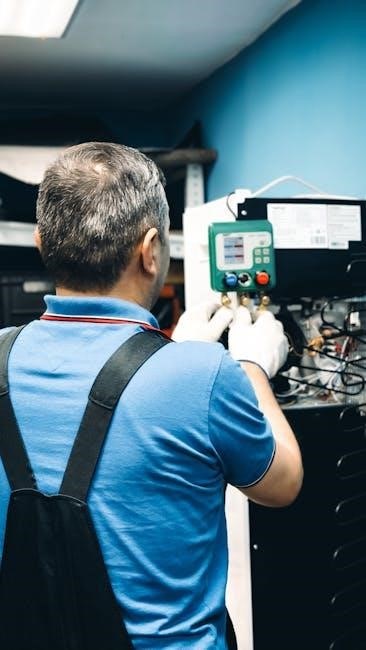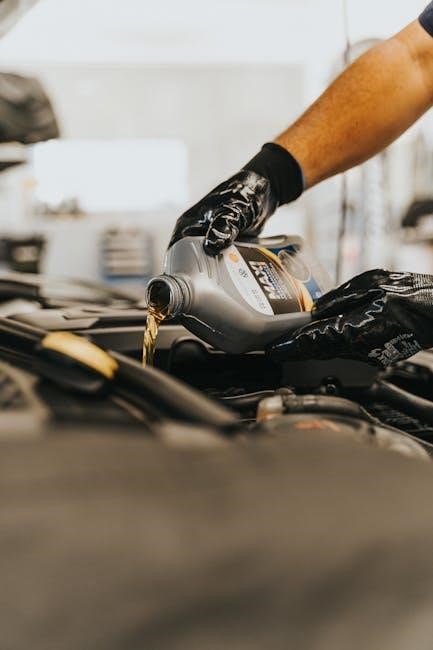The Nissan Service Maintenance Guide provides essential insights and schedules to ensure optimal vehicle performance, safety, and longevity. Regular maintenance is crucial for preserving your Nissan’s health, warranty, and resale value. This guide offers model-specific advice, helping owners follow recommended intervals and procedures to maintain their vehicle in peak condition. By adhering to the outlined schedule, drivers can prevent costly repairs and enjoy a smoother driving experience. Nissan’s expertise ensures every service is tailored to your vehicle’s needs, promoting reliability and efficiency.
Importance of Regular Maintenance for Nissan Vehicles
Importance of Regular Maintenance for Nissan Vehicles
Regular maintenance is vital for ensuring your Nissan vehicle’s performance, reliability, and safety. It helps prevent potential issues before they escalate, saving time and money. By following Nissan’s recommended schedule, you can ensure your vehicle operates efficiently, reduce the risk of unexpected repairs, and maintain its warranty. Proper care also enhances fuel efficiency and overall driving experience. Neglecting maintenance can lead to premature wear and costly damage. Consistent upkeep protects your investment and ensures your Nissan remains in optimal condition for years to come.

Nissan Service Maintenance Schedule
Nissan’s maintenance schedule ensures optimal performance by outlining service intervals tailored to your vehicle’s needs. Regular check-ups every 10,000 miles or annually maintain reliability and longevity, preventing costly repairs and ensuring warranty validity. Adhering to this schedule enhances fuel efficiency, safety, and overall driving experience, while protecting your investment. Consult your owner’s manual or a certified Nissan dealer for personalized maintenance plans.
Recommended Maintenance Intervals
Recommended Maintenance Intervals
Nissan recommends maintenance every 10,000 miles or once a year, depending on driving conditions. Regular oil changes, tire rotations, and inspections are crucial for optimal performance. At 15,000 miles, additional services like brake inspections and fluid checks are advised. Severe driving conditions may require more frequent servicing. Following these intervals ensures reliability, prevents potential issues, and maintains warranty coverage. Neglecting scheduled maintenance can lead to costly repairs and reduced vehicle longevity. Always consult your owner’s manual for model-specific recommendations and adhere to Nissan’s guidelines for a smooth driving experience.
Mileage-Based Service Requirements
Nissan outlines specific mileage-based services to ensure vehicle longevity and performance. At 7,500 miles, oil and filter changes, tire rotations, and inspections are recommended. By 15,000 miles, additional checks for brakes, fluids, and belts are advised. Severe driving conditions may require more frequent servicing. Neglecting these milestones can lead to premature wear and costly repairs. Adhering to these intervals ensures optimal performance, safety, and warranty compliance. Always consult your owner’s manual for precise recommendations tailored to your Nissan model and driving habits to maintain peak condition and reliability.
Impact of Driving Habits on Maintenance Needs
Driving habits significantly influence maintenance requirements for Nissan vehicles; Aggressive driving, frequent stop-and-go traffic, extreme temperatures, and towing can accelerate wear on components like brakes, engine, and transmission. Severe conditions may require more frequent oil changes, fluid checks, and inspections. Regular city driving or heavy loads also affect tire wear and suspension health. Nissan recommends adjusting maintenance intervals based on individual driving patterns to prevent premature damage and ensure optimal performance. Consulting the owner’s manual or a Nissan dealer helps tailor a maintenance plan to specific usage conditions.

Essential Maintenance Services
Essential maintenance services for Nissan vehicles include oil changes, tire rotations, brake inspections, battery checks, and air filter replacements. These services ensure optimal performance, safety, and longevity, preventing unexpected repairs and maintaining warranty coverage.
Oil Change and Filter Replacement
Oil Change and Filter Replacement
Regular oil changes and filter replacements are vital for maintaining your Nissan’s engine health. Nissan recommends changing the oil every 5,000 to 7,500 miles, depending on driving conditions. Using the correct grade of oil ensures optimal engine performance and longevity. The oil filter should be replaced at the same time to prevent contamination. Neglecting this service can lead to engine damage and decreased fuel efficiency. Always use genuine Nissan parts for reliability and adhere to the schedule outlined in your vehicle’s maintenance guide to keep your engine running smoothly.
Tire Rotation and Pressure Checks
Tire Rotation and Pressure Checks
Regular tire rotation and pressure checks are essential for maintaining even tread wear, improving fuel efficiency, and ensuring safety. Nissan recommends rotating tires every 5,000 to 7,500 miles, depending on driving conditions. Proper tire pressure, as specified in your vehicle’s manual, optimizes handling and reduces wear. Underinflated tires can lead to uneven wear and reduced performance. Always use a tire pressure gauge for accurate readings and adjust pressures when tires are cold. Regular checks help prevent premature wear and ensure your Nissan drives smoothly and safely.
Brake Inspection and Pad Replacement
Brake Inspection and Pad Replacement
Regular brake inspections are crucial for ensuring safety and optimal performance. Nissan recommends inspecting brake pads every 10,000 to 15,000 miles and replacing them when worn down to 1/8 inch or less. Signs of worn pads include squealing noises, spongy brake feel, or longer stopping distances. Rotors should also be checked for warping or excessive wear. Proper brake maintenance prevents costly repairs and ensures reliable braking. Always use genuine Nissan parts for replacements to maintain quality and performance, and consult a certified technician for professional service.
Battery Health and Terminal Cleaning
Battery health is vital for reliable engine starting and electrical system performance. Nissan recommends inspecting the battery every 6 months and before long trips. Look for signs of wear, such as corrosion on terminals or dimming headlights. Clean terminals with a wire brush and baking soda solution to ensure proper connections. Test battery voltage and charging systems annually. Replace the battery if it shows signs of aging or weak performance. Proper maintenance extends battery life and prevents unexpected breakdowns, ensuring consistent power delivery to your vehicle’s systems.
Cabin and Engine Air Filter Replacement
Regular replacement of cabin and engine air filters is essential for maintaining optimal performance and comfort. The cabin air filter should be replaced every 18,000 miles or during scheduled maintenance to ensure clean air circulation inside the vehicle. The engine air filter, typically replaced every 30,000 miles, improves fuel efficiency and engine performance. Dirty filters can lead to reduced airflow, decreased efficiency, and increased emissions. Always use genuine Nissan parts for replacement to maintain warranty validity and ensure proper fitment. Consult your owner’s manual for model-specific recommendations and intervals.

Nissan Service Maintenance Guide Specifics
Nissan’s guide offers tailored maintenance plans, addressing model-specific needs, driving conditions, and unique vehicle requirements. It ensures optimal care for each Nissan, enhancing performance and longevity.
Understanding the Nissan Service Manual
Understanding the Nissan Service Manual
The Nissan Service Manual is a comprehensive guide detailing maintenance and repair procedures for Nissan vehicles. It provides step-by-step instructions, diagrams, and specifications to help owners and technicians perform routine services and complex repairs. The manual covers essential tasks like oil changes, filter replacements, and brake inspections, ensuring compliance with manufacturer standards. By following the manual, users can maintain their vehicle’s performance, safety, and warranty. It also includes model-specific information, making it an indispensable resource for Nissan owners seeking to keep their cars in optimal condition.
Model-Specific Maintenance Requirements
Each Nissan model has unique maintenance needs, outlined in the service manual. For instance, the Altima, Sentra, and Rogue each have tailored schedules. The manual provides detailed maintenance intervals and specifications for each vehicle, ensuring optimal performance and warranty compliance. Regular services like oil changes and tire rotations are standardized, but specific models may require additional checks. Adhering to these requirements helps maintain your Nissan’s health and ensures reliability. Always consult your model’s manual for precise guidance.
Nissan Altima Maintenance Schedule
The Nissan Altima maintenance schedule is designed to ensure long-term reliability and performance. Routine services like oil changes are recommended every 5,000 to 7,500 miles, while tire rotations are suggested every 15,000 miles. Brake pad inspections should occur every 30,000 miles, and the timing belt replacement is typically needed at 105,000 miles. Air filter replacements and fluid checks are also essential. Follow the schedule to maintain your Altima’s optimal condition and prevent unexpected issues. Always consult your owner’s manual or a Nissan dealer for personalized advice.
Nissan Sentra Service Intervals
Nissan Sentra service intervals are tailored to maintain its performance and reliability. Oil changes are recommended every 5,000 to 7,500 miles, with tire rotations every 15,000 miles. Brake pad inspections should occur at 30,000-mile intervals, while cabin air filters are typically replaced every 18,000 miles. The timing belt is usually replaced around 105,000 miles. Following these schedules ensures optimal engine health, fuel efficiency, and overall vehicle reliability. Always refer to your owner’s manual or consult a certified Nissan technician for personalized service recommendations tailored to your driving habits and conditions.
Nissan Rogue Maintenance Checklist
The Nissan Rogue maintenance checklist ensures longevity and peak performance. Regular oil changes are recommended every 5,000 to 7,500 miles, with tire rotations every 15,000 miles. Brake pads should be inspected at 30,000-mile intervals, and the CVT transmission fluid should be checked every 60,000 miles. Replace the timing belt at 105,000 miles and inspect the drivetrain annually. Cabin and engine air filters should be replaced every 18,000 miles. Adhering to this schedule enhances fuel efficiency, reduces repair costs, and ensures reliable performance. Always consult your owner’s manual or a certified Nissan technician for personalized advice.

Transmission and Drivetrain Maintenance
Regular fluid checks for automatic and CVT transmissions ensure smooth operation. Replace timing belts at recommended intervals and inspect drivetrain components annually for optimal performance and durability.
Automatic Transmission Fluid Checks
Automatic Transmission Fluid Checks
Regular automatic transmission fluid (ATF) checks are vital for smooth gear shifts and long-term performance. Nissan recommends checking ATF levels every 15,000 to 30,000 miles, depending on driving conditions. Use genuine Nissan transmission fluid to ensure compatibility and optimal lubrication. Improper fluid levels or degraded fluid can lead to reduced transmission life and increased repair costs. Always consult your Nissan service manual or visit an authorized dealer for accurate fluid checks and replacements. Proper ATF maintenance ensures your transmission operates efficiently, preventing premature wear and potential failures.
CVT Transmission Maintenance Tips
CVT Transmission Maintenance Tips
CVT (Continuously Variable Transmission) maintenance is crucial for smooth operation and longevity. Nissan recommends using genuine CVT fluid, as specified in your service manual. Fluid changes are typically needed every 30,000 to 60,000 miles, depending on driving conditions. Monitor for symptoms like slipping or hesitation, which may indicate fluid degradation. Avoid extreme temperatures and towing, as they can strain the CVT. Regular inspections during scheduled services can prevent costly repairs. Always adhere to Nissan’s guidelines to ensure optimal performance and extend the life of your CVT transmission.
Timing Belt Replacement Intervals
Timing Belt Replacement Intervals
The timing belt is a critical component that synchronizes engine operations. Nissan recommends replacing it every 60,000 to 105,000 miles, depending on the model and driving conditions. Signs of wear, such as cracks or frays, should be addressed immediately. Neglecting replacement can lead to engine failure. Always use genuine Nissan parts for optimal performance. Regular inspections during routine maintenance can help identify potential issues early. Follow the service manual guidelines to ensure your timing belt is replaced at the correct interval, preventing costly repairs and maintaining engine efficiency.
Drivetrain Inspection and Lubrication
Drivetrain Inspection and Lubrication
Regular drivetrain inspection ensures smooth power transmission and prevents mechanical failures. Inspect axles, joints, and gears for wear or damage. Lubricate components with genuine Nissan grease to maintain optimal performance. Neglecting drivetrain maintenance can lead to reduced traction and control. Schedule inspections every 30,000 miles or as specified in your service manual. Proper lubrication enhances durability and efficiency, ensuring your Nissan operates at its best. Addressing drivetrain issues early prevents costly repairs and keeps your vehicle running safely and reliably.

Preventive Maintenance Tips
Regular vehicle checks and timely inspections are key to preventing issues. Monitor fluid levels, tire pressure, and belts to ensure optimal performance and avoid unexpected breakdowns.
Monitoring Dashboard Warning Lights
Monitoring Dashboard Warning Lights
Always monitor dashboard warning lights, as they indicate potential issues; Ignoring them can lead to severe damage. Consult your owner’s manual to understand each light’s meaning. Oil change or tire pressure lights are straightforward, while others may signal critical systems. Addressing issues promptly prevents breakdowns. Schedule service with authorized Nissan dealers for professional diagnostics. Timely responses ensure safety, efficiency, and longevity of your vehicle. Keeping an eye on these indicators is a proactive step in maintaining your Nissan’s optimal performance and reliability.
Importance of Using Genuine Nissan Parts
Importance of Using Genuine Nissan Parts
Using genuine Nissan parts ensures safety, quality, and compatibility with your vehicle. They are specifically designed to meet Nissan’s standards, guaranteeing optimal performance and longevity. Genuine parts maintain your vehicle’s warranty and prevent potential damage from non-approved components. They are rigorously tested for reliability and durability, reducing the risk of costly repairs. Choosing authentic Nissan parts supports your vehicle’s overall health and ensures it operates as intended. Always opt for genuine parts to uphold your Nissan’s integrity and performance.
Seasonal Maintenance Advice
Seasonal Maintenance Advice
Adjusting your maintenance routine for seasonal changes ensures your Nissan performs optimally year-round. In winter, check antifreeze levels, battery health, and tire tread for cold weather. Summer requires attention to coolant levels, air conditioning efficiency, and wiper blades. Spring is ideal for inspecting belts, hoses, and air filters after winter’s harsh conditions. Fall involves preparing for cooler temperatures by checking fluids and brake systems. Regular seasonal checks help prevent issues, ensuring reliability and safety in all weather conditions. Stay proactive to maintain your vehicle’s peak performance throughout the year.

Nissan Service Cost and Warranty
Nissan service costs vary by model and mileage, with routine maintenance averaging $500-$700 annually. Warranty coverage requires adherence to scheduled maintenance, ensuring genuine parts are used for validity.
Average Cost of Routine Services
Average Cost of Routine Services
The average cost of routine services for Nissan vehicles typically ranges between $500 and $700 annually, depending on the model, mileage, and services required. Oil changes, tire rotations, and brake inspections are common routine services, costing around $100-$200 each. More extensive services, such as transmission fluid replacements or timing belt changes, can range from $300 to $1,000. Using genuine Nissan parts and adhering to recommended intervals ensures reliability and warranty validity. Costs may vary based on location and dealership rates, so consulting your owner’s manual or a certified dealer is recommended for personalized estimates.
Cost-Effective Maintenance Solutions
Cost-Effective Maintenance Solutions
Implementing cost-effective maintenance strategies can help reduce expenses while maintaining your Nissan’s performance. Regular servicing at authorized dealers often includes bundled packages that save money. Using genuine Nissan parts ensures longevity and avoids costly repairs. DIY maintenance for simple tasks, like oil changes, can lower costs, but ensure proper techniques are followed. Nissan’s Service Protection Plan offers prepaid maintenance, providing upfront savings. Seasonal promotions and loyalty programs at dealerships can also reduce service costs; Prioritizing preventive care avoids future expensive fixes, making it a smart investment for long-term vehicle health.
Warranty Considerations for Maintenance
Warranty Considerations for Maintenance
Adhering to the Nissan Service Maintenance Guide is crucial for maintaining your vehicle’s warranty. Regular maintenance ensures compliance with warranty terms, protecting against potential claims denial. Using genuine Nissan parts and authorized dealers guarantees warranty validity. Neglecting scheduled services may void coverage, while proper documentation of maintenance acts as proof of compliance. Understanding warranty conditions ensures your Nissan remains protected and performs optimally. Always consult your owner’s manual or dealer for specific warranty requirements and maintenance recommendations tailored to your vehicle.

Frequently Asked Questions
This section addresses common queries about Nissan maintenance, such as service frequency, DIY possibilities, and the consequences of skipped maintenance, providing clarity for optimal vehicle care.
How Often Should I Service My Nissan?
How Often Should I Service My Nissan?
Nissan recommends servicing your vehicle every 10,000 miles or once a year, depending on driving conditions. Routine maintenance, such as oil changes, should occur every 5,000 to 7,500 miles. Tire rotations are suggested every 5,000 to 8,000 miles to ensure even wear. Brake inspections and fluid checks should be done every 12,000 to 15,000 miles. Model-specific schedules may vary, so always consult your owner’s manual or a certified Nissan dealer for precise guidance tailored to your vehicle’s needs and local driving habits.
Can I Perform Maintenance Myself?
Can I Perform Maintenance Myself?
Yes, basic maintenance tasks like oil changes, tire rotations, and air filter replacements can be done yourself. Nissan provides detailed guides and resources, including free PDF manuals and video tutorials, to help owners perform routine services. However, complex tasks like transmission fluid checks, timing belt replacements, or brake inspections may require professional expertise. Always use genuine Nissan parts to ensure compatibility and maintain your vehicle’s warranty. If unsure, consult a certified Nissan technician for assistance, especially for model-specific or advanced maintenance needs.
What Happens if I Skip Scheduled Maintenance?
What Happens if I Skip Scheduled Maintenance?
Skipping scheduled maintenance can lead to decreased performance, reduced fuel efficiency, and increased repair costs. Over time, neglected services may cause critical components like the engine or transmission to fail. For example, delaying oil changes can result in engine damage, while ignoring brake inspections can compromise safety. Additionally, skipping maintenance may void your vehicle’s warranty. Consistent adherence to Nissan’s recommended schedule ensures reliability, prevents breakdowns, and maintains your vehicle’s overall health. Regular check-ups are essential for identifying potential issues before they escalate into costly problems.
Regular maintenance ensures your Nissan’s optimal performance, prevents mechanical issues, and extends its lifespan. Following the guide guarantees safety, reliability, and a smooth driving experience always.
Benefits of Following the Nissan Service Guide
Following the Nissan Service Guide ensures optimal vehicle performance, improves fuel efficiency, and extends the lifespan of your car. Regular maintenance prevents unexpected repairs, enhances safety, and maintains warranty coverage. Adhering to the guide helps preserve your investment, ensuring reliability and confidence on the road. It also contributes to better engine health, reduces emissions, and keeps your Nissan running smoothly for years. By staying proactive, you avoid costly breakdowns and enjoy a hassle-free driving experience, making it a smart choice for responsible ownership.
